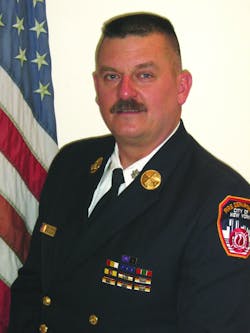The Fire Scene: The Leadership Arena
Leadership is an important topic in the American fire service. One of the best things about leadership is that there is no set group of skills that works best for everyone. You certainly can’t say that about too many other skills, abilities or tactics in the fire service. Sure, there are always a couple of ways to accomplish most tasks, but leadership skills are all over the map.
For example, there might be a career lieutenant in an engine company who is quite stern and rigid in the way he manages his crew, and they are a well-respected and top-notch group. Then there’s an officer who has a much more easy-going style, and his crew is also well respected and performs well. Clearly there’s a wide array of skills and styles that officers use to lead their units. The key point here is that leadership skills are unique to each leader.
Who’s in the arena?
A “leadership arena” refers to the physical group in which a leader exists. Let’s consider a lieutenant in a fire company that has a group of firefighters who work the same shift with him. So now we have a boss or officer who has some leadership responsibilities related to the firefighters on his shift. He needs to establish a rapport with these folks and get to know them, keep them well trained and safe, and help them successfully accomplish their duties. Is that it? Are those the only leadership skills that this lieutenant needs to master? No! This lieutenant also has a captain in the company with whom he interacts. When he is working with the firefighters, he is the boss and the leader. When he is engaging the captain, he is a fellow officer, but he is also lower on the chain of command and must consider that relationship as well. This is the lieutenant’s leadership arena. In many fire departments, company officers live in a two-dimensional leadership arena.
So what about that captain? Obviously the captain’s leadership arena involves his lieutenants—his junior officers—for whom he is directly responsible. The captain may even be the person who selects which lieutenants are assigned to the unit. The captain needs to supervise, monitor and train the officers, just like the lieutenant does with the firefighters. In many departments, the captain commands a shift exactly like the lieutenants do, so they also have the identical leadership responsibilities as the lieutenants.
The captain also has an ongoing relationship with his supervisor, a battalion chief. This is now a third leadership dimension for the captain. Not only does he directly engage firefighters and lieutenants, but he has an even more unique relationship with the chief.
Consider this scenario: The captain, who knows the lieutenants and firefighters well since he has worked there for years, is informed by the chief of a change in department policy that will not be popular back at the firehouse. What now? Well, we must first remember that officers—all officers—are leaders and agents of the chief and of the department. Suddenly it may not be so much fun to be a boss. Remember also that we are not for or against any of the groups with which we interact. When situations develop or changes are made or people make mistakes, it is simply something that must be dealt with. How you deal with the various situations you encounter as a fire service leader is up to you and will usually be the result of years of personal and professional development.
So how can you best manage your leadership arena to be the best leader possible? A good first step is to identify the different dimensions or groups with which you interact as a leader. That lieutenant needs to deal with the firefighters in a way that will get the most out of them and provide the most benefit for them. That same officer may have to establish a different, but still genuine, attitude with his superiors.
Final thoughts
This management of leadership skills is what separates the good from the great! Don't be afraid to deal with different people in different ways. Always be sincere. Always be truthful. And always do what will best serve your citizens and community first.
About the Author
John J. Salka Jr.
Battalion Chief
JOHN J. SALKA JR., who is a Firehouse contributing editor, retired as a battalion chief with FDNY, serving as commander of the 18th battalion in the Bronx. Salka has instructed at several FDNY training programs, including the department’s Probationary Firefighters School, Captains Management Program and Battalion Chiefs Command Course. He conducts training programs at national and local conferences and has been recognized for his firefighter survival course, “Get Out Alive.” Salka co-authored the FDNY Engine Company Operations manual and wrote the book "First In, Last Out–Leadership Lessons From the New York Fire Department." He also operates Fire Command Training, which is a New York-based fire service training and consulting firm.

